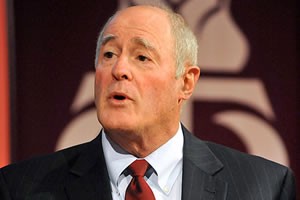
Archives for February 2015
Good job, Broncos!
Coming soon
Bulldog bus
Deadline to run for local office this Friday
With just hours left for candidates to sign up, it appears no local governments will be having elections this year due to a lack of candidates.
The sign-up deadline is this Friday, February 27; and as the Enterprise goes to press Tuesday afternoon, only one of five governments even have enough candidates to fill all the seats that are up this spring.
The City of Clarendon has the mayor and two aldermen positions, and Mayor Larry Hicks and Alderman Sandy Skelton are running for re-election. Britton Hall has also signed up to run for alderman.
The City of Howardwick has its mayor and two aldermen positions up. Mayor Mike Rowland is running, and so is Alderman Gail Leathers.
Clarendon ISD has two board positions up for election, and only Wayne Hardin had signed up for re-election at press time.
Hedley ISD has two positions up also, and only Dana Bell is seeking re-election.
Three seats are up on the board of the Donley County Hospital District. Wayne Tubbs (Place One) and Melinda McAnear (Place 3) have signed up to run again. Carey Wann in (Place Two) had not filed at press time.
Hedley has three seats on its board of aldermen up this year, and no one has filed for those positions. If at least one person doesn’t sign up there, that board could lose its quorum and be unable to meet.
All local boards are elected on an at-large system, although hospital board members do have to run for a specific place on the board. All positions are two-year terms except school board members, which serve three-year terms.
Applications and more information are available at each entity’s administrative office.
Filing continues through February 27, 2015. This year’s elections will be held on May 9. Local boards will likely cancel uncontested elections.
CC Regents extend Riza’s contract
The contract of Clarendon College President Robert Riza was extended when the CC Board of Regents met in regular session last Thursday, February 19.
Regents met behind closed doors for nearly an hour and a half discussing college personnel, evaluating the president, and discussing real property leases in Childress and Amarillo.
When they resumed in open session, regents approved extending Dr. Riza’s contract through June 1, 2018, and approved an increase in salary for the president as well.
The board voted also to approve a three-year lease renewal with the Childress Economic Development Corp. for the college’s center in that city. The new lease will commence on September 1.
Regents considered and then approved enrolling the McConnell Farm, property the college owns in Carson County, in the upcoming federal farm bill.
Faculty rank recommendations were considered and approved with Instructor Kim Jeffery being advanced to Assistant Professor and Interim Instructor Lauraine Paul being advanced in rank to Interim Associate Professor.
The board approved the hiring of Dr. Catherine Rosser as the college’s RN consultant and acknowledged the resignation of accountant Alice Cobb.
In his president’s report, Dr. Riza presented the 2015 employee survey which showed improved satisfaction by employees compared to the survey from 2014.
Riza also updated the board of regents on the actions of the CC Pampa Center Foundation, which is continuing its dual credit scholarships for Gray County high school students on the free and reduced lunch program and is making plans to erect a bell tower on the campus in Pampa.
Vice President of Instruction Roger Schusteriet recognized Linda Rowland to update the board on the success of the developmental math pilot program that was designed and implemented by her and Dr. Jeremy Sain.
Seliger targets state standardized exams
By Morgan Smith, The Texas Tribune
Texas lawmakers took aim at the state’s standardized testing system Thursday as they considered a proposal to allow high school seniors to graduate even if they fail state exams.

“It’s heart-wrenching, and it’s also insanity when you see the level of achievement these kids are already doing and yet they can’t even pass this test,” said Senate Education Committee Chairman Larry Taylor (R-Friendswood) whose panel was hearing testimony on the bill.
About 28,000 students in the class of 2015 – or about one in 10 high school seniors – still must pass one or more of the five required state exams in English I, English II, U.S. history, biology and algebra I.
Senate Bill 149 by state Sen. Kel Seliger (R-Amarillo) would allow districts to set up panels made up of educators, counselors and parents to weigh factors like grades, college entrance exam scores and attendance to determine whether a student should graduate despite failing state standardized exams.
Wanda Bamberg, the super-intendent of the Aldine Independent School District, told senators she was “no longer comfortable” holding students back from graduating based on state exams because of doubts she had about the accuracy of their scoring.
She said about 390 seniors in her district still needed to pass a state exam to graduate, and estimated that the legislation would probably help at least 300 of them receive a diploma on time.
With the exception of the U.S. history exam, which usually comes at the end of the junior year, students have typically taken all the tests they need to pass to graduate by the time they finish their sophomore year. If they don’t pass, they have a chance to retake the exams during during any of three additional testing periods each year until they graduate. In May, students in the class of 2015 will have one last chance to take exams they’ve failed.
As they discussed the proposal, a few senators wondered whether it might dissuade students from performing well on state exams.
“I think it’s walking a fine line to disincentivize students from doing their best,” said state Sen. Donna Campbell (R-New Braunfels) after noting she approved of the intention behind the legislation.
State Sen. Lois Kolkhorst (R-Brenham) asked whether having a panel made up of educators who might be docked in school ratings if a student failed to graduate would be able to make an objective decision.
But Kolkhorst added given the complaints, maybe state exams should be dumped altogether.
“How much do we spend on end-of-course exams? Maybe we should just throw those out and save the money,” she said. “If we are going to give a pathway where we don’t have to pass the end of course exams … I just say why do we need the end of course exams?”
The panel otherwise appeared largely in support of the measure, praising Seliger for bringing it forward. The bill will have to get the support of four-fifths of lawmakers in each chamber to bypass a ban on considering legislation in the first 60 days of the session to take effect in time for this year’s seniors.
On Thursday, after Taylor acknowledged his intent to fast-track the bill to the floor, the committee left the bill pending.








Reader Comments